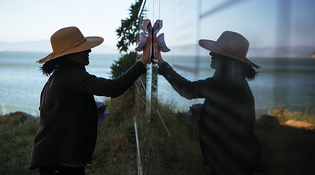 loading
loading
featuresDay of Service: Taking up the weed whackerVolunteers cleaned up at the former Angel Island Immigration Station in San Francisco Bay.  Jeff EnlowStefania Palmyra Geraki ’06, ’10MArch, wipes down plaques on a marble wall dedicated to immigrants who came through Angel Island, once a point of entry to the United States. [Note: in our print edition, we misidentified Geraki in the caption for this article and the cover. We regret the error.] View full imageNormally, the 8:30 a.m. weekend ferry to Angel Island State Park is for employees only. On May 12, however, Grant Din ’79 and six other Yale alumni (along with three of their friends) were also on the boat, cutting through the layer of fog blanketing the North Bay. After the short ride, Din led the way up a steep flight of stairs, then along winding, hilly paths, everyone stripping off layers as they climbed. At the entrance to the Immigration Station, he gave a quick history lesson. Din, who lives in Oakland, has been organizing a Yale Day of Service on Angel Island for seven years, always with the goal of freshening up the landscaping. He worked for the Angel Island Immigration Station Foundation for eight years, but the place is also special to him because all four of his grandparents came through it when they emigrated from southern China: from 1910 to 1940, it was a primary point of entry for immigrants to the West Coast. At lunch, the volunteers would gather around a binder he keeps of family records. But first, they had work to do. A park staff member told the volunteers what needed to be done and which tool to use for each chore. The volunteers quickly picked their tools, dispersed, and became absorbed in their work. Nephrologist Steve Gluck ’73 went straight for the power weed whacker. It was his birthday. He had no regrets. “What can be better?” he asked. “I get to go to a national park I’ve never been to, and get a private tour. It’s the ultimate birthday.” “I could pull weeds all day,” said Kimberly Guo ’17, drawing on gardening gloves. Her parents immigrated from southern China 30 years ago, before she was born. But she chose to come to Angel Island today because she wanted to learn more about the Chinese Exclusion Act, which Din compared to some current politics. “To single out people from a certain country is a big thing. There was no attack on America by Chinese, but they claimed for economic reasons Chinese should not be allowed,” he said. He called it “scapegoating of immigrants.” Under a cloudless sky and piercing sun, Din was hitting the flat side of a shovel against hard dirt on a small hill near the station’s entrance. Down the road, Anushka Fernandopulle ’99MBA was wiping down plaques on a marble wall above a stretch of beach. The wharf at her back was where many immigrants took their first steps on US soil; the plaques are dedicated to ancestors. “If a family comes here to see these plaques and they’re dirty . . .” —she trailed off, shaking her head. “I feel responsible for this area.” By 11:00, Din had conquered the side of the hill. All up and down the paved road, volunteers had discarded piles of thistly weeds. Meanwhile, Fernandopulle had seen a visitor find his family on the wall—on a plaque she had cleaned. “I really feel accomplished,” she said.
The comment period has expired.
|
|